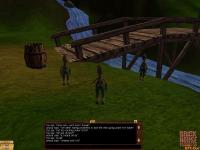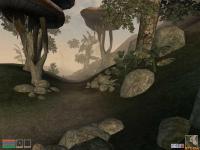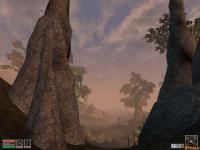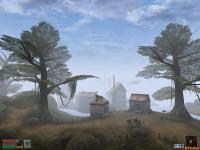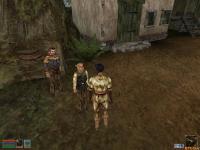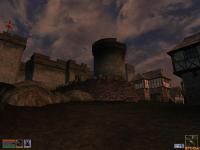|
|
|
Main News Forums Games Games Database Top 100 Release List Support Files Features Reviews Previews Interviews Editorials Diaries Misc Download Gallery Music Screenshots Videos Miscellaneous Staff Members Privacy Statement |
Morrowind Review
The open gameplay may be a problem for the casual roleplayer - there are little directions to follow when you leave the main storyline, and since you can go everywhere every time, it is up to you to make decisions. If you are used to games like Diablo or Dungeon Siege, where you had to go from A to B with little distractions, Morrowind will be a whole new experience for you. Even Baldur's Gate looks fairly linear compared to this game. Some people complain that walking is rather slow, and they end up running all the time, as long as their fatigue allows it. I can see that this may be a nuisance to some, but personally, I like the fact that some things in Morrowind are slow. Actually, when I have no agenda, I prefer to walk. I always hated that everybody in Dark Age of Camelot was running like some corporate fool on his quest for a career. And running was ON by default in DaoC - yiiek! Generally speaking, there are five things for you to do in Morrowind: Combat, Magic, Stealth, Questing and taking care of your finances. Apart from that, the most important thing during gameplay is to get to know the island, regarding geography and lore. If you allow yourself to read the books found in the game and to listen to the tales, you find a detailed background with lots of info for your game. Of course it is not important to read a book about elven proverbs, but it is fun, and only doing the important things is a sickness of our times - not one in Vvardenfell :-).
Now, let's have a closer look at some of the aspects of gameplay.
Apart from conventional attacks with swords, spears, axes, daggers and blunt weapons, you can attack your foes with ranged weapons like bows and thrown knives. This is a separate skill, and once you got it up higher, it's a convenient way to fight. Hand to hand combat doesn't actually damage the health of the opponent, it damages fatigue until he becomes unconscious. After that, you start to hurt him. Hand to hand combat is a little bit flawed, since even with your skill at 100, it's the weakest method of fighting. I would not advise you to make a character based on that attack style alone (although you can wear enchanted gloves that do additional damage). There's a large variety of weapons in Morrowind, and since weapons and ammunition can be enchanted, the diversity is nearly endless. Just to give you some examples: you can enchant your weapon with a spell that transfers health to you, poison it, make it paralyzing, you can add fire damage, make the opponent blind, silence him - you name it, you can do it. Your opponents have various methods of responding: melee attack as well as magic. What they use for defending (swords and armor) can be looted from their bodies after you killed them. Generally speaking: the better the armor of melee oriented NPC looks, the harder they are to overcome (but there are unpleasant surprises in the game, like outcasts with weak armor and deadly weapon skills). All in all, combat is done in a convenient, but not brilliant way. Once you reach level 30, there isn't much to withstand your attacks if you play a fighter type, but still magic users can harm you. If you are in for exciting fights, there are better games for that alone. There are three kinds of armor in the game as well: light, medium and heavy. Heavy armor lets you get tired faster, but offers better protection. Light armor is rather weak, but doesn't slow you down a lot. These armors come in different qualities and different looks, and hunting for cool looking pieces is quite some fun. Weapons and armor degrade when used, and you would be wise to repair them yourself (a skill) or let them repair by certain vendors. Worn armor gives less protection, worn weapons do less damage.
There are lots of magical items in the game, and you can make them by yourself with the enchant skill. Nice things are robes of healing or enchanted swords, and if you are a powerful enchanter, you may even add permanent effects to items (like raise intelligence for ten points). In order to enchant items, you will have to use soul gems. Soul gems trap the soul of killed creatures which then is used to create or reload enchanted items. To catch a soul in the gem, you have to use the spell called "soul trap" and kill the creature within a certain amount of time thereafter. The stronger the creature, the stronger the soul, and soulgems come in different qualities, too. You can even let items enchant for you in guilds, but strong enchantments have unbelievable prices (tens of thousands of gold), and you will see that this means that you can't afford them due to some economy restrictions in the game we will talk about later on. The third kind of "magic" in the game is alchemy, once again a skill. It lets you combine ingredients to make potions with spell-like effects. Each ingredient in the game has four effects, of which you know zero with low alchemy skills and two if you start with an alchemy specialization. In order to create potions, you have to have at least two matching effects on two different ingredients, and the quality of your potion depends on your skill and the quality of the apparatus you are using (you need four of them). Alchemy can be a good source of income, and in order to get the necessary ingredients, you have to visit places all over Vvardenfell - so it is fun to play an alchemist, at least in the latter stages of the game.
Thievery in Morrowind is fun. But if you get caught, the punishment can be severe. Picking a lock is relatively cheap, but attacking a person that didn't attack you first will get you in jail if you can't pay the high fine, where random skills will be reduced. So, playing a thief or assassin requires strong nerves.
During quests, you will enter dungeons (300+ are said to be in Morrowind) and tombs, travel to distant cities and escort people from A to B. The largest Dungeons I have seen so far can be completed in less than 20 minutes, and from looking at the editor files I can safely say that there are no massive dungeons like a complete level of Ultima Underworld. This is something I miss, but I am sure that some folks with the construction kit will add them to the game. I haven't found a boring or silly quest so far, and they all add to the atmosphere of the game.
Greetings and fight taunts are recorded, most of the dialog isn't. This is due to the huge amount of text in the game, and recording all of that would have been way too expensive (I know what I am talking about. I have recorded 1000+ commercials myself). Sometimes the initial reaction and the things people tell you do not fit, but this is very rare indeed. The NPCs are animated using skeletal animation, they are dressed differently and have some nice idle animations and idle sounds as well. Walking through a town and seeing the passers-by is a nice view - only when they are far away and some animation cycles are skipped for performance reasons, they tend to look a little stiff. But get close, and you know why there are 5000+ polygons per NPC - they are very detailed and realistic. Conversation is done using a hyperlink tree, and navigation through the topics is relatively easy. If attacked, NPCs react according to their class - so don't mess around with the guys in the mage's guild early on, they will instantly kill you :-) Overall, NPCs are nicely done, although they don't have personalities, at least not many of them. This is how we rate |
|||||||||
|
All original content of this site is copyrighted by RPGWatch. Copying or reproducing of any part of this site is strictly prohibited. Taking anything from this site without authorisation will be considered stealing and we'll be forced to visit you and jump on your legs until you give it back. |
||




